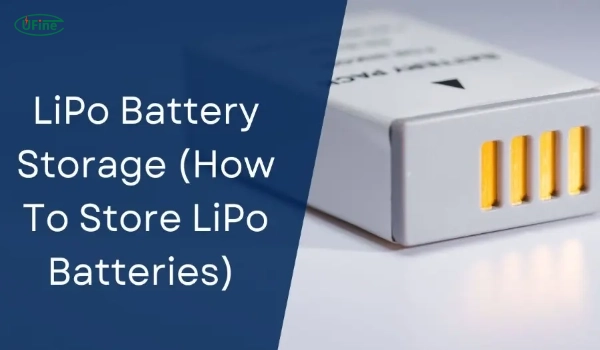
Lithium Polymer (LiPo) batteries are widely used for their lightweight design, high energy density, and sustained power delivery. However, improper storage can reduce battery lifespan, degrade performance, or even cause fire hazards. Understanding the best practices for LiPo battery storage is essential to maintain safety and efficiency.
Proper LiPo battery storage is essential to maintain performance, prevent fire risks, and extend battery lifespan. This guide covers optimal charge levels, temperature, humidity, and safe containers, offering step-by-step advice for home, travel, and long-term storage.
Quick answer: How to store LiPo batteries safely?
Store LiPo batteries at 50-60% charge in a fireproof container or LiPo safety bag, at a temperature of 15°C-25°C in a dry, ventilated area. Avoid full or empty charge storage to extend battery lifespan and prevent fire hazards. Optimal LiPo battery storage ensures safety and longevity.
Part 1. Key Influences on LiPo Battery Storage
1. Temperature for LiPo Battery Storage
LiPo batteries are sensitive to temperature extremes. High temperatures accelerate chemical reactions inside the battery, causing faster degradation and capacity loss. Cold environments may temporarily reduce performance. Maintain a storage temperature between 15°C and 25°C (59°F–77°F) for optimal battery health.
2. Humidity Control for LiPo Batteries
Moisture can damage LiPo batteries by corroding internal components and causing short circuits. Store batteries in dry, ventilated areas to prevent corrosion and maintain performance.
3. Charge Level for Safe LiPo Storage
Long-term storage at full charge or fully depleted levels damages battery health. Keep LiPo batteries at around 50-60% charge to preserve stability and longevity.
4. Keep Away from Fire
LiPo batteries are flammable. Always store them away from heat sources, open flames, or flammable materials to minimize fire risk.
5. Duration of Storage
Extended storage without maintenance can affect performance. Regularly cycling and monitoring battery charge helps prevent degradation over time.
Part 2. LiPo Battery Storage Tips for Home
- Suitable Containers: Use fireproof LiPo storage containers or LiPo-safe bags to contain potential fire hazards if a battery malfunctions.
- Ventilation: Ensure proper airflow in storage areas to disperse gases that may accumulate from battery degradation.
- Isolation: Keep batteries separate from flammable materials and other electronics to prevent damage or fire hazards.
- Labeling: Clearly label containers with battery type, charge level, and storage instructions for easy identification and compliance with safety guidelines.
Part 3. LiPo Battery Storage Tips for Travel
Vehicles
- Secure Mounting: Secure batteries to prevent movement during travel using straps or closed compartments.
- Temperature Regulation: Avoid direct sunlight or heat sources like engines; store in ventilated areas.
- Protection from Damage: Place batteries in protective containers or padded enclosures to prevent impacts.
Aircraft
- Pre-flight Checks: Charge batteries partially, not fully, and confirm airline regulations on capacity and quantity.
- Safe Packaging: Carry LiPo batteries in carry-on baggage when possible, inside fireproof and impact-resistant containers.
- Regulations Compliance: Follow airline rules strictly regarding the transport of lithium batteries.
Part 4. Long-Term Storage LiPo Battery
- Charge Level: Maintain 50-60% charge for long-term storage to preserve battery health.
- Storage Temperature: Store in a cool, dry place away from sunlight or heat sources, ideally 15°C–25°C (59°F–77°F).
- Monitoring: Check battery voltage every few months and recharge if significantly discharged.
- Voltage Maintenance: Avoid storing fully charged or fully depleted batteries.
- LiPo Safe Bag: Use fireproof containers or bags designed for LiPo batteries to reduce fire risk.
Related Article: Can Lithium Batteries Be in the Water?
Part 5. FAQs about LiPo battery storage
How to store LiPo batteries safely?
Keep batteries at 50–60% charge in a fireproof LiPo bag or metal container, in a cool (15°C–25°C), dry, ventilated area to ensure safety and longevity.
What are the best practices for LiPo battery storage?
Store batteries in a cool, dry, ventilated environment at 50–60% charge, avoid extreme temperatures, and use fireproof containers.
How long do LiPo batteries last in storage mode?
Properly stored LiPo batteries at ~3.8–3.85V per cell can retain charge for several months, depending on quality and storage conditions.
Is it safe to store LiPo batteries?
Yes, if stored at moderate charge, in fireproof containers, and away from moisture and heat according to proper guidelines.
Do LiPo batteries catch fire in storage?
LiPo batteries are flammable, but following safe storage protocols greatly reduces risks. Avoid damage and mishandling.
Related Tags:
More Articles

What are Watts and Watt Hours in Battery?
Understand watt vs watt-hour in batteries, how to calculate battery watt hours, and what Wh means for car batteries, devices, and energy storage.
A Complete Guide to the Best Batteries for Flashlights
Compare the best batteries for flashlights, including AA, AAA, 18650, 21700, CR123A. See which battery offers the best brightness, runtime, and reliability.
How Long Do Rechargeable AA Batteries Last?
How long do rechargeable AA batteries last? Compare NiMH and lithium AA lifespan, recharge cycles, key factors, and performance vs alkaline batteries.
How Much Current Can a 9V Battery Really Supply?
Discover how many amps a 9V battery can supply, its actual current output, discharge rate, and capacity for alkaline, lithium, and rechargeable 9V batteries.
12V STD vs 12V AGM: Meaning, Differences, and Which Is Better
Understand what STD and AGM batteries mean, their key differences, and which 12V battery fits your needs best in 2026.



